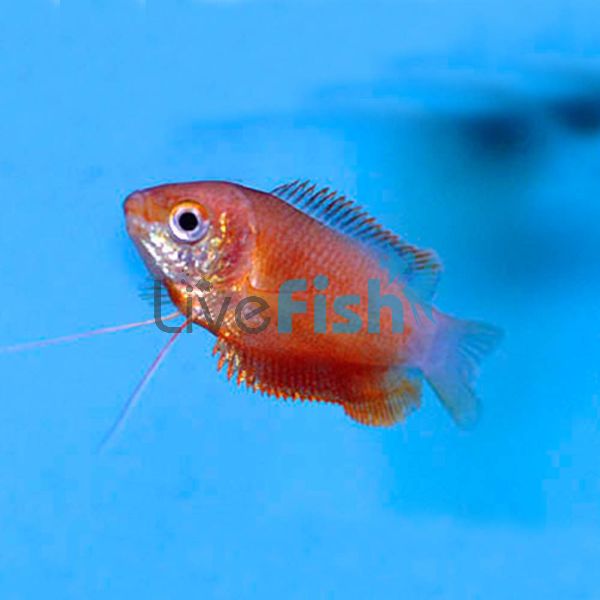Thicklip Gourami - Sunset 4cm
The Thicklip Gourami has been a underrated oddball in the aquarium hobby for many years. They tend to not have much appeal due to their bland colours compared to other gourami however through selective breeding, aquarists have been able to introduce the sunset variety. This is a captivating species known for its peaceful demeanour and striking colouration.
Thick Lip Gourami - Sunset
The Thicklip Gourami has been an underrated oddball in the aquarium hobby for many years. They tend to not have much appeal due to their bland colours compared to another gourami however through selective breeding, aquarists have been able to introduce the sunset variety. This is a captivating species known for its peaceful demeanour and striking colouration. Their robust nature makes them a popular choice among both novice and experienced aquarium enthusiasts. These fish are easily recognised by their thick lips and the warm sunset hues they develop as they mature.
The Sunset Thicklip Gourami has a body shape typical of gouramis, with a broad, laterally compressed body and long dorsal and ventral fins. They exhibit a beautiful gradient of colours ranging from a soft yellow to a rich, orangish-red hue, especially pronounced in the males of the species. The body may have subtle patterning, and the fins are often edged in a delicate orange tint, enhancing their look. The sunset colour gene is present in other anabantid fish like Honey Gourami and Paradise Fish but the Thicklip Gourami seem to present it best.
Breeding Sunset Thicklip Gouramis can be a rewarding experience since these fish aren’t as prolific in the aquarium hobby. An aquarium set aside for breeding should have subdued lighting and plenty of floating plants to provide the necessary cover for these shy breeders. Like with many gourami species, the male is responsible for building a bubble nest to attract a female for spawning.
Tank Recommendations for Sunset Thicklip Gourami
Sunset Thicklip Gouramis are well-suited to a variety of aquarium settings, but they thrive particularly well in tanks that mimic their natural habitat. A minimum tank size of 75 litres provides adequate space for a pair or small group. Lighting with a warmer tone will show off the stunning, bright colours of these fish as well. Plants, driftwood, and botanicals will offer hiding spots and contribute help with providing a natural habitat. A temperature range of 22-26 degrees Celsius and slightly acidic to neutral pH would be the ideal parameters.
Suitable Tank Buddies
The Sunset Thicklip Gourami is an incredibly peaceful fish that can get along with a multitude of peaceful community fish. When selecting tank mates, consider species that appreciate similar conditions and share a gentle nature.
Usually Compatible
Small Cyprinids, Dwarf Corydoras, Tetras, Rasboras, and other gentle gouramis can coexist with the Sunset Thicklip Gourami. Additionally, peaceful bottom dwellers such as loaches can be suitable companions.
Sometimes Compatible
Larger Tetras, Rainbowfish, and other middle-dwelling species that are not overly active or aggressive can sometimes be compatible, provided the tank is spacious enough to allow each species their respective territories.
Rarely Compatible
Larger cichlids such as the Oscars, Jaguar cichlids, and African Cichlids should be avoided to maintain the peaceful environment that Sunset Thicklip Gouramis require.
Feeding your Striped Barb
Sunset Thicklip Gouramis are not particularly fussy eaters and will readily accept a variety of foods. They should be given a good quality floating pellet or flake food. this should also be supplemented with frozen foods such as black worms, blood worms, or brine shrimp to bring out optimal health and colours in the fish.
| Scientific Name | Trichogaster labiosa |
|---|---|
| Care Level | Easy |
| Common Names | Thicklip Gourami, Sunset Gourami |
| Diet | Omnivore |
| Fish Family | Osphronemidae |
| Lifespan (years) | 6 |
| Max. Length (cm) | 8 |
| Min. Tank Volume (l) | 75 |
| Origin | Southeast Asia |
| Reef Safe | Yes |
| Sociability | Peaceful |
| Venomous | No |
| Water Conditions | 22-26° C, pH 6.0 - 7.0 |




